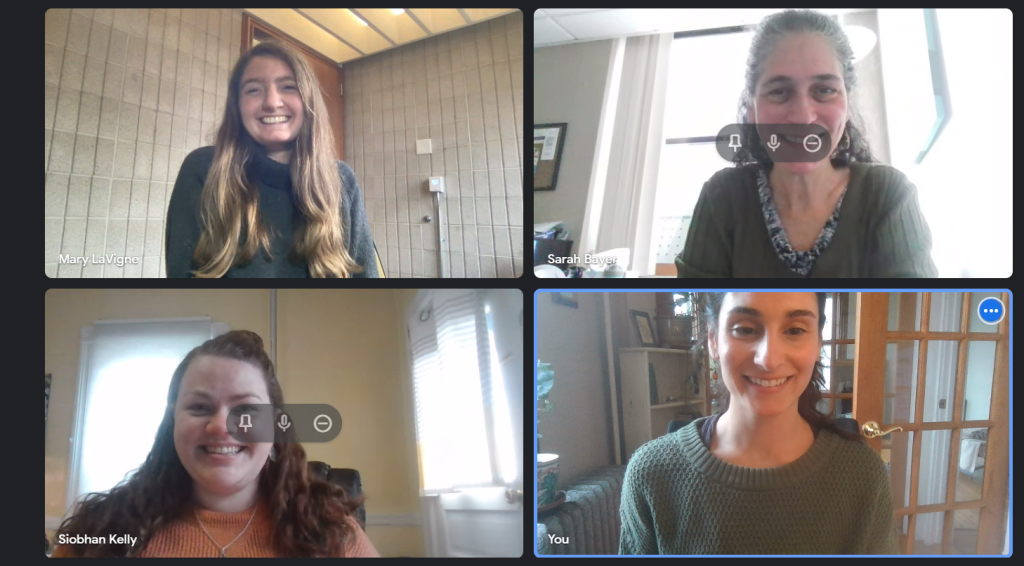Providing Group Support | Q&A With Rian Social Worker, Tori DiCianni

The Resource & Support Services team is excited to share about the work they have done over the last year to offer virtual mutual aid groups for Rian’s clients. RSS started last spring by offering a group for women identified at a level 2 and above English proficiency speakers and then launched a women identified Spanish speakers group in September. Each group meets weekly on zoom for 1 hour and has 2 facilitators.
RSS Social Worker, Victoria DiCianni has led the effort to bring these groups into fruition and is a co-facilitator in both groups. Director of RSS, Sarah Bayer shared these questions with Victoria and here are her responses:
Can you share why you felt it was important to offer this particular model of group support to our RSS clients and how the group is facilitated?
Many reasons! Of course we know social support is a major contributor to a sense of well-being and a protective factor for people generally. Many of our clients in particular have experienced a loss or major shift in social support and connection through their migration to the US, and this was intensified by the pandemic. In my direct work with clients, I noticed this common thread of people feeling isolated and alone in their experiences, so part of the idea was to offer a voluntary opportunity for social support and connection. In addition, many of our clients face barriers to accessing mental health services, such as overwhelmed community clinics and staff shortages, long wait lists, lack of (or barriers to) health insurance, not to mention the challenges of finding care that recognizes the specific context and stressors faced by many immigrants in the US and that considers cultural and linguistic components of care. For some clients, the groups offer an alternative or supplement to traditional mental health care. We deliberately created our groups based on a model of mutual aid, which is a process of group work that’s primary focus is on creating an environment of mutual support between group members, as opposed to the group model we often see where the helping comes primarily from the practitioner. In our groups, clients view themselves and each other as sources of support. They recognize the individual strengths, skills, and experiences they each bring and draw on those to support each other for a variety of things. The result is connection and community, collective problem solving, and resource sharing.
How did the RSS team decide on the specific demographic for each group (ie women-identified, etc.) and do you foresee new groups starting up?
The groups are entirely based on the relationships we have with clients through our RSS clinical/accompaniment work and the patterns or shared experiences we observe through these relationships. For example, our first group was launched targeting women-identified clients who have at least an intermediate level of English language proficiency because of our work with a number of women who described experiences of isolation and/or an expressed desire for connection and support. Our Spanish-speaking women’s group was inspired by a client who wished to be a part of a women’s’ group, as well as the expressed experiences of a number of other Spanish-speaking clients. We do foresee new groups starting up! Our team is continuously assessing whether we might have the basis to offer a new group.
What kind of topics are shared in the group? And how do you think these groups are helpful to the group members?
In our groups, members decide what they’d like to talk about, how they talk about it, and the format of the group – everyone is encouraged to speak freely and spontaneously. Some topics discussed are joys and challenges of motherhood, navigating educational and health systems in the US, experiences of discrimination in the workplace, self-care and stress management as caregivers, and short and long term goals. Women bring these topics forward as being important and relevant to their lives and we’ve seen the power of them coming together to reflect on these. I think in general the groups help clients to recognize that they are not alone in their struggles and to witness how others’ have managed or overcome similar obstacles. There is also an exchange of strengths and a lot of explicit encouragement – group members are there for each other and encourage each other to keep hope alive in the face of adversity.
Do you see a way for this approach/model to expand within the RSS Program?
Yes! However, this is still very new for us, so I think we still have a lot to learn and reflect on, and to continue to ensure we’re centering clients’ ideas and preferences. I know there are other fantastic organizations offering social support interventions and I’d love to learn from and potentially collaborate with them.







